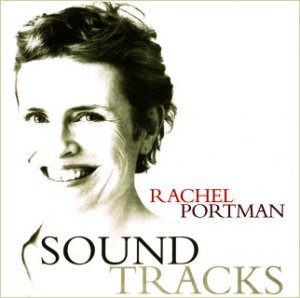The Cider House Rules, Beloved, Emma, The Closer You Get, Ratcatcher, Sirens, Marvin's Room, Benny and Joon, Where Angels Fear to Tread, The Joy Luck Club, Ethan Frome, Smoke, Only You, Life is Sweet, Oranges Are Not the Only Fruit, Great Moments in Aviation, War of the Buttons
Some film composers become successful by being able to turn their hand to any form, musical chameleons equally adept at blistering action cues or a tender love theme as penning a pastiche tango or minuet. Others become successful by establishing a unique personal style, which they vary only within narrow parameters from film to film. Rachel Portman leans very much towards the latter type of composer, though one able to assimilate a period dance style, a folk song or other genre into her own very distinctive musical persona. Her voice can be described as English pastoral, music with a lyricism springing out of the folk tradition as given orchestral voice by Vaughan Williams, Finzi, Alwyn, Moeran and other 20th century composers. Such is the uniformity of her style, that a handful of tracks excepted, there are many individual scores by other composers which show a wider variation than this entire album. Which is not to say that the album is unwelcome, or outstays its welcome, for however homogenous, the music is simply delightful.
From the pragmatic title onwards this disc could be mistaken for a composer promo, though it is actually a major label commercial issue intended for mainstream retail distribution. It contains 23 tracks lasting a little over an hour - surely the disc could have been filled? - from 17 films and TV productions made between 1989-2000. The earliest is the main title theme from the BBC drama Oranges Are Not the Only Fruit, the most recent, the main titles from last year's The Closer You Get. Other recent work represented is Ratcatcher (2000), Beloved (1998) and The Cider House Rules (1999). Presumably such recent scores as Chocolat (2000) and The Legend of Bagger Vance (2001) were unavailable at the time the disc was compiled.
There is a certain irony when a booklet note by Richard Cook points out "One of the most powerful aspect's of Rachel's work is its sense of 'completeness', as if we are listening to a full-blooded and organic end-to-end composition," yet is attached to an anthology presenting brief musical extracts. Nevertheless, those familiar with Rachel Portman's most famous score, her Oscar-winning Emma (1996), will know what to expect. There are those tracks which are pastoral and exquisitely tender, as if spun of the finest gossamer, and those which are pastoral and dynamically upbeat, set to a dance or march. The final track on the album, the end titles from War of the Buttons (1994) manages to incorporate all these facets, a lilting folk-like melody wrapped around a light-hearted and uplifting march. While there are two tracks from Emma, the most strongly represented score is Marvin's Room, also made in 1996. There are nine minutes of music over three cues, and introduced by a charming piano motif it's the sort of well groomed, polite and intelligent film music one could easily take to a dinner party. The two cues from Beloved add elements of African percussion ('Denver Goes out Yonder') and choral writing ('Uhuru') to Portman's elegantly refined approach.
Throughout this album is a quite joy, offering respite from the bombastic nature of so many other soundtracks. Certainly on the evidence here Rachel Portman is limited to a certain sort of score, but this is no criticism, merely observation. Either it is what she does best, or has decided to concentrate on, and with tunes as infectiously appealing as The Closer You Get there seems no reason to question the policy. Perhaps the other particularly successful composer of the moment to limit himself to such a pure and atmospheric sound is Zbigniew Preisner, and if you like the music of one of these composer there is a strong chance you will like the work of the other.
A thoroughly enjoyable release, though with so much material to draw upon there's really no excuse for it not being quarter of an hour longer. A second volume would be most welcome, but meanwhile this month we also have The Legend of Bagger Vance to enjoy. The sound is both lucid and limpid, and remarkably uniform in clarity and acoustics over such a large number of different recordings.
Gary S. Dalkin





